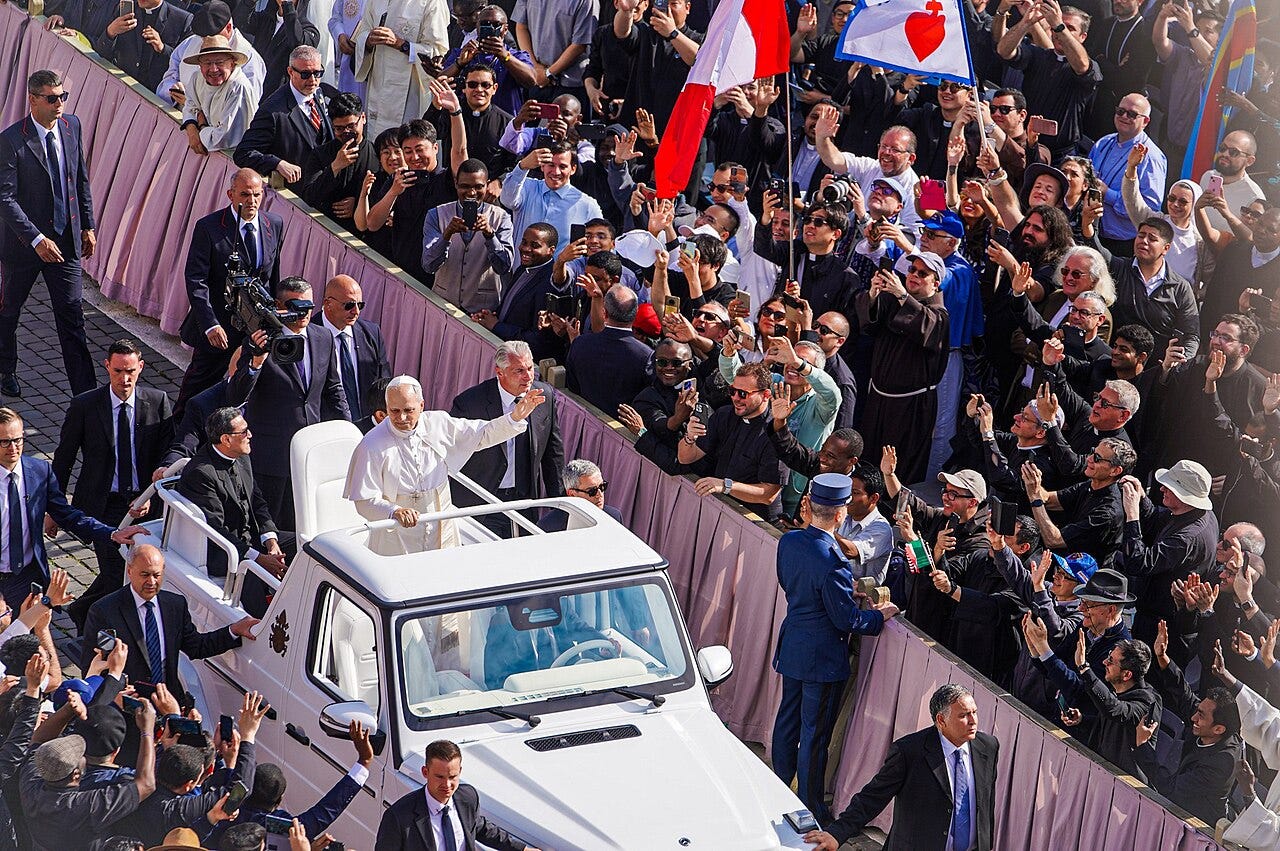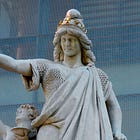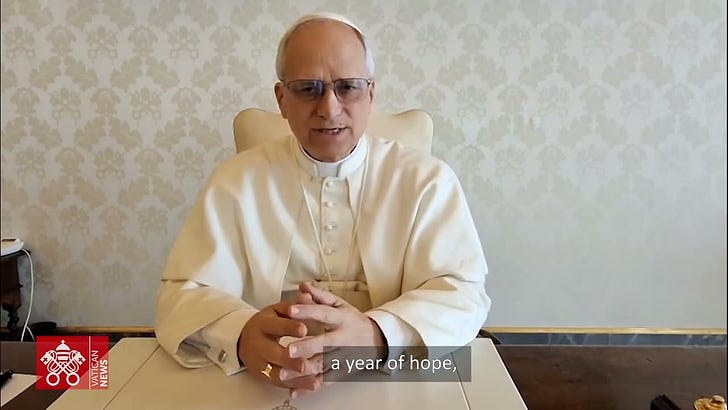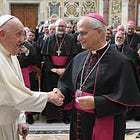Leo XIV presents naturalistic world politics vision, affirms condemned errors
Leo XIV's recent speech has been praised for its treatment of natural law, but it downplays the Gospel, denies the Church's teaching role, and embraces UN’s condemned vision of religious liberty.

(WM Reports) – In a high-profile address to international parliamentarians, Leo XIV affirmed a series of principles drawn from natural law, calling them a “shared point of reference” for all political activity.
However, while the June 21 speech has been praised by some for containing legitimate insights, its framing bypassed the Church’s foundational role in guiding political life, and expressed errors condemned by previous popes.
Leo presented the natural law as “a shared point of reference in political activity” that “united everyone.” He affirmed that the natural law “is universally valid apart from and above other more debatable beliefs,” positioning it as the guiding compass for legislation on “delicate and pressing ethical issues.”
But this approach, though outwardly conservative, shifts the foundation of public life from divine revelation to natural reason alone.
By treating the Gospel as one of those “more debatable beliefs,” the speech implicitly relativised divine revelation and the Church’s authority. It suggested that peace and justice can be achieved through natural law alone—without Christ, his Church, or supernatural grace.
Natural law, original sin and the Church
St Thomas Aquinas teaches that the precepts of the natural law that are “known to all” and “can nowise be blotted out from men’s hearts” are general principles—such as “good is to be done and pursued, evil is to be avoided.”
The “secondary and more detailed precepts”—those to which Leo XIV must be referring, if his comments are to be intelligible—are “conclusions following closely from first principles.”
However, original sin means that both types of precept can be in principle, and are in practice, “blotted out” in particular cases.
First, St Thomas says that “concupiscence or some other passion” mean that human reason can be “hindered from applying the general principle to a particular point of practice.”
He adds that the secondary principles can “be blotted out from the human heart” by “evil persuasions” and “vicious customs and corrupt habits,” such that “theft, and even unnatural vices” have not been considered as sinful by some cultures.
This is why, as Aquinas says elsewhere, divine revelation is necessary (in a relative sense) even for those truths which reason could have discovered alone, because such truths “would only be known by a few, and that after a long time, and with the admixture of many errors.”
This, in turn, is one of the central reasons that the Church is necessary for humanity; and it also demonstrates why the natural law, without regard for the Church, cannot possibly form a basis for international politics or peace.
Leo XIV’s appeal to natural law bypasses the realities of original sin, neglects the need for the Church to teach and preserve moral truth, and it assumes a capacity for ethical consensus that neither history nor Catholic doctrine supports.
The revival of Le Sillon
In bypassing the Church’s teaching authority and promoting a supposedly universal moral code grounded in human dignity and civic harmony, Leo’s speech revives the errors of Le Sillon, condemned by Pope St Pius X in Notre Charge Apostolique.
“[I]t is frightening to behold new apostles eagerly attempting to do better [than the Church] by a common interchange of vague idealism and civic virtues,” St Pius X said—adding:
What are they going to produce? What is to come of this collaboration? A mere verbal and chimerical construction in which we shall see, glowing in a jumble, and in seductive confusion, the words Liberty, Justice, Fraternity, Love, Equality, and human exultation, all resting upon an ill-understood human dignity.
He continues:
[T]he end result of this developing promiscuousness, the beneficiary of this cosmopolitan social action, can only be a Democracy which will be neither Catholic, nor Protestant, nor Jewish. It will be a religion […] more universal than the Catholic Church, uniting all men [who have] become brothers and comrades at last in the “Kingdom of God”.
The sainted Pope added that this approach is a result of “the great movement of apostasy being organized in every country,” which was aiming for:
… the establishment of a One-World Church which shall have neither dogmas, nor hierarchy, neither discipline for the mind, nor curb for the passions, and which, under the pretext of freedom and human dignity, would bring back to the world (if such a Church could [prevail]) the reign of legalized cunning and force, and the oppression of the weak, and of all those who toil and suffer.
Religious Liberty
Leo XIV also affirmed “authentic religious liberty” and cited the Universal Declaration of Human Rights, describing it as “always relevant” and “part of humanity’s cultural heritage.”
That document affirms the right to religious freedom without qualification:
Everyone is entitled to all the rights and freedoms set forth in this Declaration, without distinction of any kind, such as race, colour, sex, language, religion, political or other opinion, national or social origin, property, birth or other status.
Once again, such a vision ignores the effects of original sin, as well as the objective reality of the supernatural end to which all men are ordered.
This is why the Church consistently condemned religious liberty prior to Vatican II, with Pope Gregory XVI calling it a “deliramentum” (“insanity”).
Pius IX’s Quanta Cura and the Syllabus of Errors also condemned proposed “rights” to liberty of religion, and denounced the claim that the state has no duty to recognise or uphold the true religion, and that “[e]very man is free to embrace and profess that religion which, guided by the light of reason, he shall consider true.”
Leo XIII likewise rejected the idea that all religions should be treated equally under law, warning that such a line of conduct amounts to “legal apostasy” and the degradation of true liberty.
In spite of his appeals to some true principles, saints and prior popes, Leo XIV’s words present a political vision which reduces the Gospel to one of the “more debatable beliefs” among many, and relativises the authority of the Church.
HELP KEEP THE WM REVIEW ONLINE WITH WM+!
As we expand The WM Review we would like to keep providing free articles for everyone.
Our work takes a lot of time and effort to produce. If you have benefitted from it please do consider supporting us financially.
A subscription gets you access to our exclusive WM+ material, and helps ensure that we can keep writing and sharing free material for all.
(We make our WM+ material freely available to clergy, priests and seminarians upon request. Please subscribe and reply to the email if this applies to you.)
Subscribe to WM+ now to make sure you always receive our material. Thank you!
Read Next:
Follow on Twitter, YouTube and Telegram:




Leo appears to be tending in the direction of this unbelievable quote from Francis in January, 2016:
“I am glad to express the Church’s esteem for the National Committee on Bioethics, established by the President of the Council for Ministers in Italy 25 years ago,” Francis said. “Everyone is aware of how sensitive the Church is to ethical issues but perhaps it is not clear to everyone that the Church does not lay claim to a privileged voice in this field; in fact it is a source of great satisfaction for the Church when civic responsibility at different levels is able to reflect, discern and act according to a free and open way of thinking and inspired by integral human and social values. This mature civic responsibility is a sign that the seed of the Gospel – which has been revealed and entrusted to the Church – has produced fruits, successfully fostering the search for truth and good in complex human and ethical questions.”
A man of slimey-speech is Prevost. What does 'natural law' mean to a man who appointed a supporter of abortion and euthanasia?